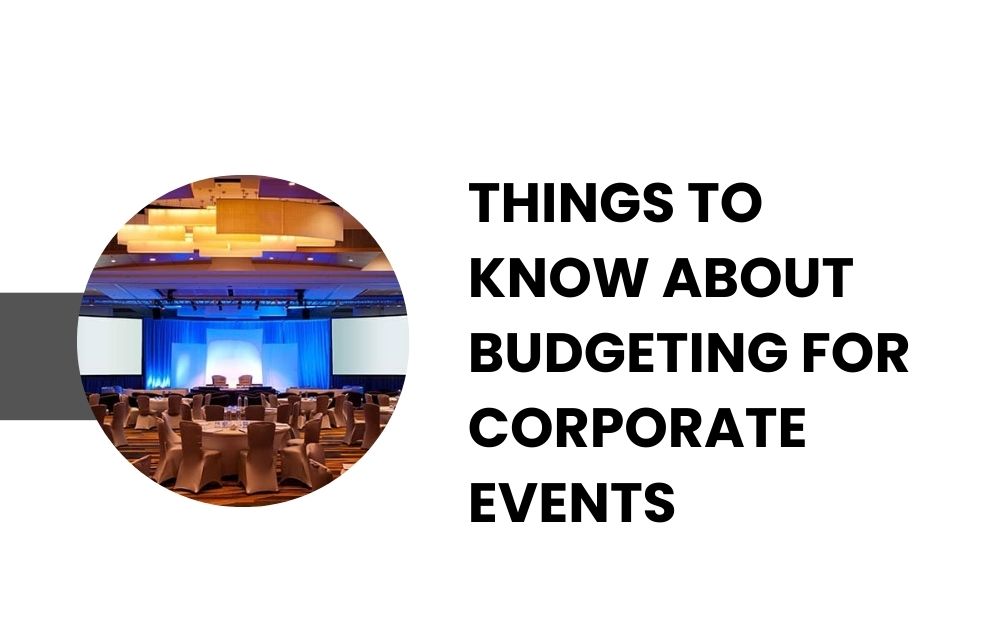Planning and organizing a corporate event can be a complex task, and budgeting plays a crucial role in ensuring its success. A well-thought-out budget helps manage expenses, avoid surprises, and make sure that every aspect of the event is covered. In this blog, we will discuss the essential aspects of budgeting for corporate events and provide tips to help you stay on track.
Why Budgeting is Crucial for Corporate Events
Proper budgeting is vital for the success of any corporate events. It allows you to plan effectively, allocate resources wisely, and ensure that your event meets its goals without exceeding financial limits.
Benefits of a Well-Planned Budget
- Financial Control: A detailed budget helps you keep track of your spending and prevents overspending.
- Resource Allocation: It helps in allocating funds to different areas, such as venue, catering, and entertainment, ensuring that all aspects of the event are covered.
- Reduced Stress: Knowing your budget and sticking to it reduces the stress of managing unexpected expenses.
Steps to Create an Effective Budget for Corporate Events
Creating a budget for a corporate event involves several steps. Here’s a simple guide to help you through the process.
1. Define Your Event Goals and Objectives
Before you start budgeting, clearly define the goals and objectives of your event. Are you hosting a conference, a product launch, or a team-building workshop? Understanding the purpose of the event helps you determine the necessary budget and resources.
2. Identify Key Budget Categories
Break down your budget into key categories. Common categories for corporate events include:
- Venue: Costs related to renting the space where the event will take place.
- Catering: Expenses for food and beverages, including service charges.
- Entertainment: Costs for speakers, performers, or any entertainment activities.
- Marketing and Promotion: Budget for advertising, promotional materials, and invitations.
- Technology: Expenses for audio-visual equipment, event apps, and other tech needs.
- Decorations and Setup: Costs for event decorations, furniture, and setup.
- Miscellaneous: Any additional expenses, such as transportation or accommodation for out-of-town guests.
3. Estimate Costs for Each Category
Once you have identified the key categories, estimate the costs for each. Research prices, get quotes from vendors, and factor in any additional expenses that might arise. Be as detailed as possible to avoid missing any costs.
4. Set a Realistic Budget Limit
Based on your estimates, set a realistic budget limit for the entire event. Ensure that your budget aligns with the goals and scale of the event. Keep in mind that it’s better to overestimate rather than underestimate to accommodate any unexpected expenses.
5. Allocate Budget to Each Category
Distribute your total budget across the identified categories. Prioritize essential areas, such as venue and catering, and allocate funds accordingly. Make sure to allocate a portion of the budget for contingencies, as unforeseen expenses can occur.
Tips for Staying on Budget
Sticking to your budget can be challenging, but with careful planning and management, you can achieve it. Here are some tips to help you stay on track.
1. Monitor Expenses Regularly
Keep track of all expenses as they occur. Use budgeting tools or software to record and monitor your spending in real time. Regularly review your budget to ensure that you are staying within your limits.
2. Negotiate with Vendors
Don’t hesitate to negotiate with vendors and suppliers to get the best deals. Many vendors are open to negotiation, especially if you’re booking multiple services or have a long-term relationship with them.

3. Avoid Unnecessary Extras
Stick to your original plan and avoid adding unnecessary extras that can increase costs. Focus on what is essential for achieving the event’s goals and avoid last-minute changes that can lead to additional expenses.
4. Review and Adjust as Needed
Regularly review your budget and make adjustments as needed. If you find that you are overspending in one category, look for ways to cut costs or reallocate funds from other areas.
How to Handle Unexpected Expenses
Despite careful planning, unexpected expenses can arise. Here’s how to handle them effectively.
1. Build a Contingency Fund
Include a contingency fund in your budget to cover unforeseen expenses. A good rule of thumb is to allocate about 10% of your total budget for unexpected costs.
2. Address Issues Promptly
If unexpected expenses arise, address them promptly. Evaluate the situation and determine whether it’s possible to adjust your budget or find alternative solutions.
3. Communicate with Stakeholders
If additional costs are significant, communicate with stakeholders and decision-makers. Transparency about budget changes helps maintain trust and allows for informed decision-making.
Conclusion
Budgeting for corporate events is a critical process that involves careful planning and management. By defining your event goals, identifying key budget categories, estimating costs, and monitoring expenses, you can create a successful and cost-effective event. Remember to stay flexible and prepare for unexpected expenses by building a contingency fund. With these steps, you can ensure that your corporate event meets its objectives while staying within budget.
Note:- To read more articles visit on luckylify.
